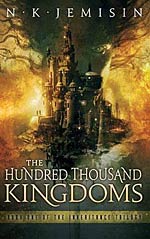
![]() Nymeria
Nymeria
4/28/2014
![]()
For me, the mark of an outstanding book is the fact that I keep thinking about it, story and characters alike, long after I've finished my reading: that is exactly what happened with N.K. Jemisin's novel - it grabbed my attention right from the start and has yet to let me go as I'm writing this review.
The core concept looks deceptively as a quest: young Yeine Darr, granddaughter of the Arameri ruler of the floating city of Sky, is summoned from the barbarian lands where she grew up to participate in the succession struggle for the throne, while trying to unravel the mystery of her mother's recent death and of the reasons she gave up her own ruling rights in favor of life among the less privileged people of Darr.
What makes this book different are the intertwining levels of intrigue and power struggle in which Yeine is enmeshed against her will, complicated by the presence of enslaved gods trapped in human form who have their own agenda. This latter is a concept I found fascinating: after the God War of the past, the winner Itempas allied himself with the humans in exchange for exclusive worship, therefore doing what all winners do - dictating how history was to be written. Yeine's "quest" becomes therefore the solving of a complicated puzzle whose pieces she gathers slowly and painfully, while wrestling with the burdens of the past, her feelings for Nahadot - the enslaved god of darkness - and the constant threats to her life.
The dimension of the story - despite the title that seems to hint at an epic scope - is therefore very human and focuses on the power play between opposing forces: light and darkness, love and hate, politics and loyalty. Yeine's voice as narrator is an interesting one, because she embodies this duality very well: she is the outsider looking in, she is the child of two clashing cultures and she struggles between the duty to her people and the new responsibilities heaped on her as one of Sky's heir designates, not to mention her desire to find her mother's murderer and avenge her death. Moreover, this duality is reinforced by the choice of framing her from the very start as a potentially unreliable narrator: I am not as I once was - this is how the novel begins, casting a doubt on what Yeine recounts of the past. The doubt is further strengthened when she admits her memories might be faulty, or incomplete; or when she appears to hold a conversation with a different part of her conscience - in what resembles a split-personality syndrome - that urges her to remember correctly, or to dredge up forgotten details.
It is this mystery within the mystery that generates a compelling story, also supported by a writing style that is swift and fresh and brings Yeine's journey along at a sustained pace, while at the same time managing to touch on many topics that must be dear to the author's heart, such as racism, cultural integration and gender issues. To Ms. Jemisin's credit I would like to stress how this is done with a subtle, non-pedantic hand, always tackling the subject in a tangential way but still making room for the reader's deeper consideration. Such subtlety is also evident in the strong vein of sensuality permeating Yeine's character, one that comes to the fore in her attraction to Nahadot: those scenes are suggestive and intense but never stray into more graphic descriptions, giving to the relationship an almost dreamy quality that never distracts you from the main story, nor becomes its sole focus despite its powerful roots.
Nahadot himself is an outstanding character: his very nature, his shifts in appearance and consistency, the strong aura of danger that surrounds him and is barely tempered by glimpses of vulnerability and honest tenderness toward Yeine, all contribute to carve him into a commanding presence and a tragic figure at the same time. In him Jemisin embodies the drama of the enslaved gods and gives them a voice that is more human because of their godlike nature and not in spite of it. This conflict between human and divine drives and needs finds its resolution in a powerful, highly gripping finale that ties the various narrative threads in a satisfying way while leaving the door open for the welcome continuation that must be the focus of the next two books.
I found The Hundred Thousand Kingdoms to be a very original story, one that went beyond any expectations I might have had before reading it. What makes it even more extraordinary is that it's a debut novel: if N.K. Jemisin's first published work is this strong, I have no doubt her next books will be even better - and that I'm firmly aboard for the ride.
http://spaceandsorcery.blogspot.it